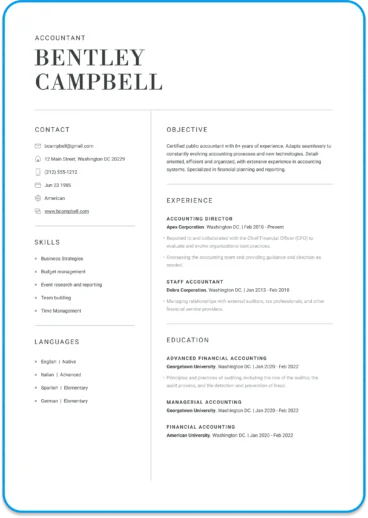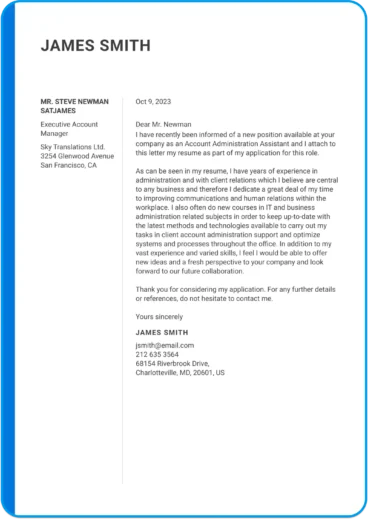Best Keywords To Use In Your Cover Letter [4 Full Examples]
Introduction.
In today's competitive job market, understanding and effectively utilizing keywords in your cover letter can significantly improve your chances of getting noticed by hiring managers and securing an interview. Many job seekers may be unaware that their cover letters are often searched for keywords, similar to how search engines scan websites for relevant terms. This process can greatly impact the likelihood of your application being reviewed and considered by potential employers. In this article, we will explore the importance of using keywords in cover letters, discuss the types of keywords that can be used, and provide guidance on how to conduct keyword research and optimize your cover letter to increase your chances of success in your job search.

Applicant Tracking Systems (ATS) and Keywords
Applicant tracking systems (ATS) are software programs used by many companies to manage their recruitment processes. These systems play a significant role in the hiring process, as they help employers filter through large volumes of applications and identify the most qualified candidates. One way they do this is by scanning cover letters and resumes for keywords that are relevant to the job posting. If your cover letter does not contain the right keywords, it may not even be seen by the hiring manager, regardless of your qualifications.
This underscores the importance of optimizing your cover letter for ATS. By incorporating relevant keywords, you increase your chances of getting past the initial screening process and having your application reviewed by a human recruiter. However, it's essential to strike a balance between using keywords effectively and maintaining a natural, professional tone in your cover letter.
Types of Keywords
There are several types of keywords that can be used in cover letters, including action verbs, recognition keywords, skills keywords, and results-oriented keywords. Understanding each type and how to use them effectively can greatly enhance your cover letter.
Action verbs are words that convey a sense of accomplishment or progress. Examples of action verbs include "managed," "achieved," "implemented," and "improved." These words can help demonstrate your ability to take initiative and make a tangible impact on your previous roles.
Recognition keywords are terms that highlight awards, accolades, or other forms of recognition you have received in your professional life. Examples include "Employee of the Month," "Top Salesperson," or "Certified Project Manager." These keywords can help showcase your achievements and set you apart from other candidates.
Skills keywords are words that describe specific abilities or expertise relevant to the job you're applying for. Examples include "data analysis," "web development," or "fluent in Spanish." These keywords can help demonstrate your qualifications and suitability for the role.
Results-oriented keywords are phrases that emphasize the outcomes or results you have achieved in your career. Examples include "increased revenue by 20%," "reduced production costs by 15%," or "improved customer satisfaction ratings." These keywords can help illustrate the tangible impact you have made in your previous roles.
Keyword Research
Conducting keyword research is a critical step in identifying the most relevant keywords for the position you're applying for. This research can help you tailor your cover letter to the specific job posting and demonstrate to the hiring manager that you have a clear understanding of what the role requires. Some methods for conducting keyword research include:
Analyzing job postings: Carefully review the job posting and take note of any words or phrases that are mentioned multiple times, as these are likely to be high-value keywords. For instance, if the job posting frequently mentions "project management" or "leadership skills," be sure to include these terms in your cover letter.
Reviewing company websites: Familiarize yourself with the company's website, mission statement, and core values. Look for keywords that align with the company's culture and goals, and incorporate them into your cover letter.
Identifying industry-specific jargon and acronyms: Be aware of any industry-specific terms or acronyms that may be relevant to the position, such as "SEO" for a digital marketing role or "CPR certification" for a healthcare position. Including these terms can demonstrate your familiarity with the industry and your ability to communicate effectively within the field.
When incorporating keywords into your cover letter, it's essential to do so naturally and avoid "keyword stuffing," which can make your cover letter sound forced and unprofessional. To maintain a balance between keyword usage and engaging content, consider using synonyms or rephrasing sentences to incorporate keywords in a way that flows well and reads smoothly.
In the next sections, we'll cover tips for using keywords effectively, provide real-life examples of successful keyword usage, and discuss common pitfalls to avoid. Stay tuned to learn how to optimize your cover letter and increase your chances of landing that coveted interview.
Tips for Using Keywords Effectively
Using keywords effectively in a cover letter requires a balance between showcasing relevant skills and experiences, while maintaining a natural and professional tone. Here are some tips to help you strike that perfect balance:
Tailor your cover letter to the specific job posting : Don't use a generic cover letter for every job application. Instead, customize your cover letter to address the specific requirements and preferences mentioned in the job posting. This will demonstrate your genuine interest in the position and your ability to adapt to different roles.
Use active voice instead of passive voice : Active voice occurs when the subject of a sentence performs the action of the verb, whereas passive voice occurs when the subject is the recipient of the action. For example, "I managed a team of five" (active voice) is more engaging and concise than "A team of five was managed by me" (passive voice). Using active voice can help you showcase your accomplishments more effectively and create a more dynamic cover letter.
Avoid keyword stuffing : While it's important to include relevant keywords in your cover letter, overusing them can make your writing sound unnatural and robotic. To prevent keyword stuffing, limit your usage of each keyword to a reasonable frequency, and focus on weaving them seamlessly into your sentences.
Format your cover letter for keyword optimization : Ensure that your cover letter is easy to read and scannable by using clear headings, bullet points, and short paragraphs. This will make it easier for ATS to identify and parse the keywords in your cover letter.
Proofread your cover letter : Always proofread your cover letter to check for errors, inconsistencies, or awkward phrasing. This will help you maintain a professional tone and ensure that your keywords are used effectively.
Real-Life Examples of Successful Keyword Usage
To illustrate the power of effective keyword usage, let's examine some real-life examples of successful cover letters. Each example demonstrates how incorporating different types of keywords can lead to positive results in the job search process.
Example 1: Sales Manager
"In my previous role as a Sales Manager , I consistently exceeded quarterly sales targets and increased revenue by 25% over two years. I also implemented a new training program that improved our team's product knowledge and boosted customer satisfaction ratings by 10%. As a Certified Sales Professional with a strong track record in business development and team leadership , I am confident that my skills and experience make me an ideal candidate for the Senior Sales Executive role at your company."
In this example, the candidate effectively uses action verbs (e.g., "implemented" and "improved"), recognition keywords ("Certified Sales Professional"), skills keywords (e.g., "business development" and "team leadership"), and results-oriented keywords (e.g., "increased revenue by 25%" and "boosted customer satisfaction ratings by 10%"). By incorporating these keywords, the candidate showcases their relevant skills and experiences, while maintaining a natural and engaging tone.
Example 2: Digital Marketing Specialist
"As a Digital Marketing Specialist with over five years of experience, I have developed a strong expertise in SEO , content creation , and social media management . I have successfully managed multiple marketing campaigns, increasing website traffic by 35% and boosting conversion rates by 20%. In my previous role, I was awarded the "Marketing Innovator of the Year" title for my creative approach to problem-solving and ability to drive results. I am excited about the opportunity to bring my data-driven strategies and analytical skills to the Marketing Manager position at your company."
In this example, the candidate uses a mix of skills keywords (e.g., "SEO," "content creation," and "social media management"), action verbs ("managed"), recognition keywords ("Marketing Innovator of the Year"), and results-oriented keywords (e.g., "increasing website traffic by 35%" and "boosting conversion rates by 20%"). This combination effectively highlights their expertise and accomplishments in digital marketing, making them a strong candidate for the role.
Example 3: Computer Science Graduate
"As a recent graduate with a degree in Computer Science , I have developed a strong foundation in software development and programming languages such as Java, Python, and C++. My coursework and internship experience have given me exposure to agile methodologies and web development using HTML, CSS, and JavaScript. For my capstone project, I designed and implemented a user-friendly mobile app that improved the efficiency of a local non-profit organization's volunteer management system. I am eager to apply my technical skills and problem-solving abilities as a Junior Software Developer at your organization."
This example highlights the candidate's skills keywords (e.g., "software development," "programming languages," "agile methodologies," and "web development"), action verbs (e.g., "designed" and "implemented"), and results-oriented keywords (e.g., "improved the efficiency"). These elements work together to demonstrate the candidate's strong technical background and readiness for a software development role.
Example 4: Human Resources Professional
"With a background in Human Resources and talent management , I have spearheaded various initiatives to optimize employee engagement, streamline recruitment processes, and enhance employee training programs. In my previous role as an HR Generalist , I reduced time-to-hire by 30% and increased employee retention by 15% through the implementation of targeted talent acquisition strategies and effective onboarding programs. My SHRM-CP certification and experience in conflict resolution and organizational development make me a strong candidate for the HR Manager position at your company."
In this example, the candidate incorporates skills keywords (e.g., "talent management," "conflict resolution," and "organizational development"), action verbs (e.g., "spearheaded," "optimized," and "enhanced"), recognition keywords ("SHRM-CP certification"), and results-oriented keywords (e.g., "reduced time-to-hire by 30%" and "increased employee retention by 15%"). This combination showcases their comprehensive experience and expertise in human resources, making them a compelling candidate for the role.
Effectively utilizing keywords in your cover letter can vastly improve your chances of standing out to hiring managers and securing an interview. By understanding the role of ATS in the hiring process, conducting thorough keyword research, and following the tips and best practices for using keywords effectively, you can optimize your cover letter and increase your chances of success in your job search. So, invest the time and effort to refine your cover letter, and watch as the interview invitations start rolling in.
- Search Please fill out this field.
- Career Planning
- Finding a Job
- Cover Letters
How to Use Keywords in Your Cover Letters
:max_bytes(150000):strip_icc():format(webp)/ADHeadshot-Cropped-b80e40469d5b4852a68f94ad69d6e8bd.jpg)
Types of Cover Letter Keywords
Skill keywords, take the time to make a match, using keywords in your resume.
When you are writing a cover letter to accompany your resume as part of a job application, it's important to make sure that every word counts. Your cover letter should enhance the employer's view of your qualifications so you can move from being an applicant to an interviewee.
The words you include in your cover letter (and your resume) can show the hiring manager why you're a strong candidate for the job and help you get selected for an interview.
Here's an overview of the types of keywords that can be included in a cover letter, how to use them, and examples of the best keywords to use to show a prospective employer that you're a match for the job.
Keywords are a vital element of a persuasive cover letter because they're capable of portraying a candidate as a highly qualified applicant for a job. These words fall into three general categories: skill words, results-oriented words, and words that show recognition for achievements.
How Keywords Show That You're a Good Fit for the Job
Keywords work in a couple of different ways. First, the keywords you include in your resume and cover letter will be used to match your application with the skills required by the employer in the job advertisement.
This matching process is often performed by automated applicant tracking systems (ATSs), which are programmed to identify specific keywords and to rank all resumes accordingly before they even reach a hiring manager. If your cover letter and resume lack these keywords, they may be automatically cut from consideration at this stage of the evaluation.
Keywords should be words that, at a glance, will show the hiring manager that you are a good fit for the job.
How Keywords Show That You're Qualified
Once your cover letter reaches a hiring manager, the keywords that are incorporated into it will show them why you are highly qualified for the job, allowing them to rank you among your competition and, ideally, to offer you one of their interview slots.
Secondly, keywords that are incorporated into a cover letter will show the hiring manager how and why you are highly qualified for the job, allowing them to rank you among your competition and, ideally, to offer one of their interview slots to you.
Job seekers should carefully analyze the skills required to excel in their target job and incorporate them into their cover letter. Those keywords should also be included in your resume. It will be more genuine if you paraphrase the skills mentioned in job ads as opposed to listing them verbatim. Skill words are most effective when connected to a specific role or project in which the skills were crucial to success.
Examples of skill keywords include wrote, analyzed, quantified, planned, programmed, designed, created, built, taught, and trained.
For example, instead of saying, "Quantitative stock analysis is an asset which I would bring to your firm," you could say the following:
I utilized quantitative stock valuation techniques to create a portfolio for high-net-worth clients that beat the market for three consecutive years.
The skill keywords included in your cover letter and resume will help your application get selected by the software employers use to select candidates for further consideration. They will also show the hiring manager, at a glance, what skills you have that are related to the job for which he or she is hiring.
Results-Oriented Keywords
All employers are looking for employees who will add value and generate positive results for their organizations. That's why it's critical to integrate results-oriented language into your cover letters. Think about the bottom line for each job on your resume and how you may have made things better in your role.
Your cover letter should showcase your accomplishments, not just your skills or personal qualities. Providing these details will help to set your letter apart from those of other candidates who don’t highlight their professional achievements.
Examples of results-oriented keywords include increased, reduced, redesigned, upgraded, initiated, implemented, reformulated, generated, and produced.
Results-oriented words are most effective when coupled with some numbers that quantify your impact:
I reduced turnover among first-year hires by 20% by implementing a mentoring system.
By using these types of keywords, you are clearly showing what you accomplished in your previous roles.
Recognition Keywords
Hiring managers will be more likely to believe you will be an outstanding performer if it is clear that previous employers have viewed you in this way. One way to do this is to incorporate language which demonstrates that employers have recognized your contributions.
Examples of recognition-related keywords include honored, awarded, promoted, selected, lauded for, received a bonus for, recognized, chosen, and credited.
Ideally, recognition phrases will include the type of individual who noted your achievement and the basis for your recognition. For example, you might say:
I was designated as the team leader for the budget reduction task force by my division vice president based on my previous record of accruing cost savings.
Recognition keywords attest to how you have excelled in your previous jobs and how you have accomplished more than was required.
When you're choosing keywords to include in your cover letter, an easy way to find the best words to use is to match your qualifications to those mentioned in the job listing.
Highlight your strongest assets so you can show the employer why you're well qualified for the job and deserving of an interview.
It's also important to use keywords in your resume that reflect the employer's job requirements and indicate how your credentials are a match for them. Your resume keywords should include your skills, competencies, relevant credentials, education, and previous positions and employers.
CareerOneStop. " Applicant Tracking Systems ." Accessed Nov. 8, 2021.
Related Articles
How To Properly Use Keywords In Your Cover Letter
- April 11, 2023
- No comments

Do you know how to properly use keywords in your cover letter? If you don’t, this article will show you how. And if you’re looking for a job, you surely understand how important it is to have a standout cover letter. However, did you realize that the success of your application might depend entirely on selecting the proper keywords?
Many employers in the modern job market utilize applicant tracking systems to search resumes and cover letters for certain keywords that meet the job criteria. As a result, it’s critical to understand how to utilize keywords effectively in your cover letter if you want to raise your chances of getting an interview.
In this article, we’ll explain what keywords are, why they’re important, and how to utilize them in your cover letter.
Keep reading!
What Are Keywords In A Cover Letter?
Keywords are simply specific words or phrases that describe the skills, qualifications, and experience that an employer is looking for in a job candidate. These could be anything from technical skills and industry-specific jargon to soft skills like “team player” and “strong communication skills.”
By including these keywords in your cover letter, you’re essentially showing the employer that you have what it takes to excel in the position they’re hiring for. Plus, using the right keywords can help your application get past those pesky automated applicant tracking systems and into the hands of a real human being!
So, don’t underestimate the power of keywords – they could be the difference between landing your dream job and getting lost in the shuffle.
How To Properly Use Keywords In Your Cover Letter
1. examine the job description.
Before you begin writing, carefully read the job description and underline any particularly important terms or phrases. Include these in your cover letter because these are the abilities and qualities the company is seeking.
2. Utilize keywords wisely
Don’t just throw them in your cover letter at random; be sure you utilize them in a way that makes sense and highlights your expertise and credentials. If the job description specifies “customer service skills,” for instance, you may cite a moment when you delivered exceptional customer service in a prior position.
3. Be specific
Use specific keywords that are pertinent to the position rather than broad, general terms. You may mention you have experience with “Agile project management methodologies” instead of saying you have “project management skills,” for instance.
4. Avoid going overboard
Although it’s crucial to include keywords in your cover letter, you don’t want to overdo it and come off as someone who is just attempting to check off a list of buzzwords. Ensure your cover letter reads smoothly and convincingly and presents your experience and qualifications.
5. Proofread
Check your cover letter thoroughly to make sure all of your keywords are spelled correctly and utilized in the appropriate sentences. How your application is seen might be completely altered by a single mistake or awkwardly placed word.
6. Use different terms
To demonstrate your flexibility and command of the subject, consider utilizing different keywords instead of the same one again. Consider adding “business development,” “lead generation,” or “client acquisition” if the job description asks for “sales skills,” for instance.
7. Highlight accomplishments
Use keywords to draw attention to your accomplishments and triumphs in past positions. Instead of merely saying that you have “leadership skills,” for instance, describe how you guided a team to complete a particular task or project.
8. Utilize industry-specific language
If you’re looking for a job in a particular sector, be sure to utilize pertinent technical terminology and industry-specific lingo. This demonstrates your thorough knowledge of the market and the demands of the position.
9. Use keywords in your opening paragraph
Use keywords in your first paragraph to draw the employer’s attention right away. Be sure to include some of the most crucial keywords in the first paragraph of your cover letter.
10. Customize your cover letter for each job
Always remember to personalize your cover letter for each job you apply for. This entails reading the job description carefully and selecting pertinent keywords that are unique to the position and organization. You’ll demonstrate to the company that you’re interested in the employment and have taken the time to customize your application by doing this.
Importance of Using Keywords In Your Cover Letter
1. helps you stand out.
To check resumes and cover letters for specific keywords, many employers utilize applicant tracking systems (ATS). Your application could never even reach a human reviewer if it lacks certain keywords. You may improve your chances of getting beyond the applicant tracking system (ATS) and into the hands of a hiring manager by selecting the proper keywords.
2. Shows your qualifications
By including job-relevant terms in your cover letter, you’re proving to the company that you possess the knowledge, abilities, and credentials they’re seeking. You may differentiate yourself from other applicants by doing this, who might not have included such terms in their applications.
3. Demonstrates your knowledge of the industry
Use of industry-specific jargon and technical phrases can demonstrate to an employer that you have a thorough understanding of the field and the demands of the position. By doing so, you may become a more appealing candidate and show the business how valuable you are.
4. Increases readability of your cover letter
Using keywords can increase the readability and scannability of your cover letter. Employing keywords might make it easier for hiring managers and recruiters to find the most pertinent information in your cover letter since they sometimes have to filter through dozens or even hundreds of applications.
5. Shows attention to deta il
Use of the appropriate keywords in your cover letter demonstrates your attention to detail and your effort to mold your application to the demands of the position. This might show how meticulous you are and how dedicated you are to your work.
6. Improves your online visibility
Using the appropriate keywords while applying for a job online might help improve your online exposure. Employers and recruiters frequently use keywords to restrict their search results when looking for applicants on job boards or social media sites. You may improve your chances of being found by potential employers by utilizing the appropriate keywords in your cover letter and other online profiles.
7. Highlights your strengths
Using keywords that highlight your accomplishments and qualities will help you stand out from other applicants who might not have done the same in their applications. You may highlight your advantages and demonstrate to the employer how you can benefit their business by employing the appropriate keywords.
8. Increases your chances of success
In the end, including keywords in your cover letter might increase your chances of landing a job. You’re more likely to get called in for an interview and be hired if you can prove that you possess the skills and credentials the business is seeking.
Example of Using Keywords In A Cover Letter
Dear Hiring Manager,
I am writing to express my interest in the Sales Representative position at XYZ Company. With two years of experience in sales and a proven track record of exceeding sales targets, I believe I would be an excellent fit for the role.
As indicated in the job posting, the ideal candidate should have experience in B2B sales, lead generation, and relationship management. In my previous role at ABC Corporation, I successfully generated new leads. I maintained strong relationships with existing clients, resulting in a 30% increase in revenue over the course of one year.
In addition to my sales expertise, I am also highly skilled in customer service, communication, and problem-solving. I am proficient in Microsoft Office and Salesforce, which I believe would be valuable assets to XYZ Company.
I am excited about the opportunity to bring my skills and experience to XYZ Company and contribute to the growth of the sales team. Thank you for considering my application.
Keywords: B2B sales, lead generation, relationship management, revenue increase.
In conclusion, choosing the appropriate keywords to include in your cover letter may have a huge impact on the outcome of your job hunt. You may improve your chances of being noticed by hiring managers and securing a job interview by customizing your application to the specific needs of the position and utilizing pertinent keywords throughout your cover letter. Use the appropriate keywords to highlight your talents, credentials, and value to the company by doing your homework, analyzing the job description, and doing your research.
Frequently Asked Questions
What are some common keywords to include in a cover letter.
Some common keywords to include in a cover letter are those that relate to the job title, required skills, and company values. Examples could include “leadership skills,” “project management,” “teamwork,” “customer service,” or “innovation.”
How many keywords should I include in my cover letter?
There is no set number of keywords to include in your cover letter, but it’s important to use them strategically and not overdo them. Aim to include the most important keywords that relate to the job requirements and your qualifications.

Can I copy and paste keywords from the job posting into my cover letter?
While it’s fine to use some of the same keywords from the job posting, you should avoid simply copying and pasting entire phrases or sentences. Instead, try to incorporate the keywords into your language and demonstrate how you meet the requirements.
Should I use the same cover letter for multiple job applications?
It’s not recommended to use the exact same cover letter for multiple job applications. Instead, customize your cover letter for each job by analyzing the job posting and incorporating relevant keywords and qualifications.
What's the best way to find keywords to include in my cover letter?
The best way to find keywords is to carefully read and analyze the job posting, company website, and other relevant materials. Look for keywords that are mentioned repeatedly or that are particularly important to the job requirements. You can also use online tools and resources to research industry-specific jargon and technical terms.
References
- How to Use Keywords in Your Cover Letters (thebalancemoney.com)
- How to Use Keywords in a Cover Letter – Resume.com Career Advice
Recommendations
- How to Start Freelancing in Nigeria
How To Start A Music Career In Nigeria
- Why You Should Consider A Career In Content Creation
- How To Write An Application Letter For Nursing Job
- cover letter
- how to use keywords
- keywords in cover letter
Leave a Reply Cancel reply
Your email address will not be published. Required fields are marked *
Save my name, email, and website in this browser for the next time I comment.
Effect Of The Japa Wave On Nigerian Businesses
How to write an application letter for a part time teaching job, you may also like.

How Can Customer Service Reshape a Business
- by FortuneWrites
- February 9, 2023

- by kemistri2022
- February 22, 2023

What is The Job of A Quality Control Manager?
- by Onu Charity
- January 12, 2023

What Should You Say When Asked, “Why Should We Hire You?”
- January 23, 2023

Why Should You Consider A Career In Agriculture
- January 30, 2023

How To Get A Job In Shell Nigeria
- February 17, 2023
Keywords and phrases for your cover letter
If you want to score an interview and land your dream job, you need a great cover letter and resume. Crafting an engaging cover letter involves much more than highlighting what you do well and why you want to work there. You’ve also got to use the right cover letter keywords. Here’s what you need to know.
If you want to score an interview and land your dream job, you need a great cover letter and resume. Crafting an engaging cover letter involves much more than highlighting what you do well and why you want to work there. You’ve also got to use the right cover letter keywords. Here’s what you need to know.
What are cover letter keywords?
Cover letter keywords are phrases or terms that will stand out to hiring teams when they review your application. For continuity’s sake, you should also include cover letter phrases in your resume . After all, these documents are meant to be complementary tools that give hiring teams a glimpse into who you are, your skill set, and your aptitude.
You are probably wondering, “Do human resources professionals really look for cover letter keywords?” Absolutely! Many actively look for terms that illustrate you understand the position and have read the job description. They may also be subconsciously looking for certain phrases.
Additionally, 60% of HR professionals are using artificial intelligence for hiring and recruiting purposes. (1) AI-powered CV and resume review tools may scan your documents for select phrases and terms. If you don’t include them, your application may get filtered out of the selection process.
Phrases and keywords can add spice to your cover letter
The top cover letters are well-organized, concise, impactful, and engaging. By adhering to cover letter best practices, you can stand out and increase your odds of landing an interview. Cover letter keywords play a key role in spicing up your application and differentiating you from the average candidate.
When working key terms into your resume and cover letter, focus on industry- and role-specific terms. For example, if you are applying to an IT position, mention certifications or specific skills that match the role you want.
Not sure which phrases to incorporate into your application? Review the job description and build your list around the employer’s list of qualifications, preferred abilities, and summary of the role. If you use similar language to that found in the job description, the employer will notice.
However, be careful not to use too many cliche keywords. For the most part, you should avoid things like “punctual,” “great communication,” or “organized.” While these are valuable traits, they are typically prerequisites for any job. If you are hired, it’s presumed that you are going to show up on time and stay organized.
Employers want to know what makes you different from everyone else. That’s where industry-specific cover letter keywords really shine.
Check out several cover letter examples for a better understanding of what to do (and what not to do) when writing up your job application. You can also get helpful suggestions from resume examples , CV examples , and CV templates .
Impactful keywords and phrases to include in your cover letter
Regardless of what role you are applying for, it’s important to use terminology that showcases your value to the organization. Again, avoid cliches but instead focus on action language. Some great action verbs you can use include:
- Transformed
- Spearheaded
Use these words with more common descriptors to make a connection between your involvement and what the project or task required. For instance, you could say that you “improved client satisfaction” and then explain what you did to achieve these results. This approach is much more impactful than saying generic things like “I offer great customer service.”
This cliche phrase leaves hiring teams with more questions than answers. They want to know what you did that made your customer service “great.” Conversely, using action words and describing what you achieved showcases how you might bring value to their business.
For technical roles, mention specific technologies, methodologies, or frameworks. For example, you can mention things like “Agile project management” or “Python programming.” Be careful not to mention any skills unless you are very proficient in them. If you make it to the interview stage, most employers are going to ask you to provide examples of your work or elaborate on your skills.
Remember, you can’t just stuff a bunch of terms in your cover letter and hope for the best. The document needs a natural and engaging flow. If you are overhauling your professional documents, use cover letter templates to help you maximize engagement and readability. You can also use resume templates to ensure continuity across all of your documents.
Expert tip:
Tailoring your cover letter with job-specific keywords is crucial, but it’s equally important to narrate how you embody these terms through your experiences. This approach transforms your application from a list of skills to a compelling story of your professional journey.
Cliches and basic keywords and phrases to avoid
When crafting a cover letter, it’s easy to fall into the trap of using cliches and generic terms that recruiters have encountered hundreds of times. Though these terms are popular, they can cause your application to blend in, not stand out. Here are some examples of cliches and basic cover letter keywords to avoid:
- Hard Worker: This is overly vague and expected of any candidate
- Team Player: While important, it’s better to demonstrate this through specific examples
- Self-Motivated: Instead of stating it, show how your motivation has produced results
- Problem Solver: This is too generic without context. Highlight a specific issue you resolved
- Dynamic: This adjective gets used so much that it has lost its impact
- People Person: Talk about how you’ve successfully worked with teams or led projects
- Detail-Oriented: Share an instance where you noticed the little things and it mattered
- Proactive: Provide examples where you took initiative beyond your usual responsibilities
- Results-Driven: Quantify your achievements to prove your focus on results
- Passionate: Overused and subjective
- Strategic Thinker: Detail a situation where you saw the big picture and made a difference
- Go-Getter: As with “proactive,” it’s better to illustrate this through examples
- Innovative: Share something you contributed to rather than using this generic term
- Creative Thinker: Mention a hurdle you overcame by flexing your creativity
- Excellent Communicator: Provide examples of how you used this skill in a professional setting
- Track Record of Success: Quantify what you’ve achieved to make your words more meaningful
- Responsible: This is expected; instead, share how you’ve managed your responsibilities effectively
- Extensive Experience: Specify what this is and how it’s relevant
- Skilled in [Generic Skill]: Don’t just say you have an ability — showcase it
- Highly Qualified: Share how your qualifications match the job’s requirements
By avoiding these cliches and focusing on specific, quantifiable achievements and experience, you can create a cover letter that stands out. Remember, the goal is to show what makes you valuable and how it aligns with the needs of the employer.
Looking for more helpful tips on how to stand out in the hiring process? Read some cover letter articles and resume articles on Jobseeker that detail best practices and things to avoid. It’s also important to find out how to end a cover letter so you’ll make the best impression possible.
“ Employers want to know what makes you different from everyone else. That’s where industry-specific cover letter keywords really shine.”
Integrating cover letter keywords into your application can be a true game-changer. Here are some simple tips to help you make the most of eye-catching buzzwords and phrases:
- Don’t oversaturate your cover letter with phrases; use them strategically
- Avoid too much technical jargon
- Use similar keywords in both your resume and cover letter
- Treat these documents as complementary and minimize redundancy
- Whenever possible, back up your keywords with hard data
That last tip is probably one of the most impactful. Making a statement is not nearly as powerful as supporting your claims with specific numbers. For instance, if you led a successful project, share what you achieved, such as beating the deadline by one week or reducing costs by 10%.
Stand out with powerful cover letter keywords and phrases
Cover letter keywords are an important way to differentiate yourself from other job seekers. As you write your next resume, CV, or cover letter, make sure to incorporate target phrases that align with what hiring teams are looking for in a candidate. Before you know it, you’ll be scheduling interviews and making progress in your search for your dream job.
Source:
(1) Jobsolv (via Medium.com) : How Jobseekers Can Leverage AI in The Hiring Process
Get ahead of the competition
Stand out from other candidates with your job application

How to Write a Strong Relocation Cover Letter

Creating a Europass Cover Letter

How to Name-Drop in a Cover Letter, with Tips
Resume Templates
Resume samples

Create and edit your resume online
Generate compelling resumes with our AI resume builder and secure employment quickly.
Write a cover letter

Take a look at our cover letter guides and examples, to help you write a cover letter that complement your resume and enhace your applications.
Cover Letter Examples
Cover Letter Samples

Create and edit your cover letter
Use our user-friendly tool to create the perfect cover letter.
Featured articles
- How to Write a Motivation Letter With Examples
- How To Write a Resume in 2025 That Gets Results
- Teamwork Skills on Your Resume: List and Examples
- What Are the Best Colors for Your Resume?
Latests articles
- Your Step-by-Step Guide to Building a Career Development Plan
- How To Respond to a Rejection Email
- 5 Things to Do When You Are Overqualified for a Job
- Silent Strengths: Top Jobs for Introverts

Dive Into Expert Guides to Enhance your Resume
Cover Letter Keywords That Can Make Your Document a Success

The difference between a good cover letter and a great cover letter can often depend on the words you use. Cover letter keywords can make a drastic difference in the success or failure of your document.
Keywords in your cover letter have never been more important. Employers today almost universally using applicant tracking systems (ATS) and not using a high enough volume of key terms and phrases could scupper your chances well before a human recruiter has read a single word of your application.
To help you avoid this fate, the following guide explains how to use keywords for your cover letter effectively . It looks into the best words you can use for each section of the document that can be interwoven into the main text.
Important Keywords for a Cover Letter
Normally, the keywords you use will very much depend on the type of job you are chasing . Nevertheless, there are many generic terms that can be used to add some extra power to your document no matter the position you’re looking to poach. These, however, will also differ depending on the part of the letter you’re approaching.
What Keywords Should Appear in the Introduction?
When starting off your letter, the key theme to have in mind is positivity. You need to communicate that you are excited about the opportunity that’s become available and show the employer why you’d be a good pick. To do this you need to use expressions and words that can quickly show that you’re keen and qualified.
- Strong impression
- Hit the ground running
What Keywords to Use in the Main Body
During this part of the document, you must try to create a case for why you would be a good fit in the position. To do this, it’s going to be highly important that you use industry-specific terms that apply to your profession. Recruiters will want to see practical examples of what you can do and also what sort of results you pulled in.
The most important generic keywords in this case, are going to be based on Key Performance Indicators (KPIs) . These are going to be mostly numerical in nature but the statistics you use are going to need to be paired with effective verbs and measuring criteria. These are going to be highly important for catching the eye of the recruiter and include the following:
Also, don’t be afraid to squeeze in a few terms that can give a good indication of your soft skills and ways of working. The following words will normally do the trick for this:
- Communicate
Keywords to Use in the Closing Paragraph
At this point in the letter, it’s important to remind the reader of your enthusiasm for the role being offered. You always want to end on the most positive note possible whilst subtly moving the conversation forward to the next stages of the hiring process. You can do just that with examples of the following phrases that restate your interest and indicate your availability:
- Looking forward to speaking
- Keen to talk more about the position
- Delighted to provide more information
- Eager to talk in person
- a privilege to discuss the position at length
A Few Final Thoughts on Writing With Cover Letter Keywords
Like any effective application document, a cover letter should always be focused and dynamic. A good way to communicate some of this energy on paper this is with action verbs and short focused sentences .
Remember that consistency is important , especially when matching up the cover letter with the resume . The way that you describe a task you’ve completed a skill you possess should broadly line up between the two documents.
Also, don’t forget about not falling into the old trap of cliché . These days it’s almost expected that you might refer to yourself as a “good team player” or “results-oriented”, so these are better avoided. You can still touch on these abilities but it’s better to rephrase them.
Try to also look out for over-repetition . If you’re finding occurrences of the same words popping up more than once per paragraph or sentence, consider swapping an example out for a synonym.
A good cover letter doesn’t need to be a work of literature. If anything the more focused you can make it the better and the use of keywords helps to bring this all together with much more ease than you might imagine.
ResumeCoach has everything you need to optimize your cover letter and resume design . With easy-to-use document builders and professional templates, it’s simple to create the perfect application assets in just a few manageable steps.

Struggling with Resume Writing?
Ease the process with our templates
Related Posts

What are You Looking for?
- Cover Letter
- Interviewing

How to Use Keywords in Your Cover Letter
The importance of keywords in a cover letter.
In today’s competitive job market, it is essential to make your cover letter stand out from the rest. One way to do this is by incorporating keywords that are relevant to the job you are applying for. Keywords are terms or phrases that are used by recruiters and hiring managers to quickly identify whether a candidate’s skills and experience match the requirements of the job.
Research the Job Posting
Before you start writing your cover letter, carefully read the job posting to identify the key skills, qualifications, and experiences that the employer is looking for. Make a list of these keywords as they will serve as a guide for what to include in your cover letter.
Use Keywords in the Opening Paragraph
The opening paragraph of your cover letter is where you should introduce yourself and express your interest in the position. It is also a good place to incorporate keywords that are relevant to the job. For example, if the job posting mentions that the employer is looking for someone with “teamwork” and “communication skills,” you could say something like, “I am a skilled team player with excellent communication abilities.”
Highlight Your Skills and Experiences
Use keywords throughout your cover letter to highlight your skills and experiences that are relevant to the job. Instead of simply listing your qualifications, try to demonstrate how you have used these skills in previous roles and how they have contributed to your success. For example, instead of saying, “I have excellent project management skills,” you could say, “I successfully managed a team of five people on a high-profile project, which resulted in a 20% increase in sales.”
Customize Your Cover Letter for Each Application
It is important to customize your cover letter for each job application by tailoring it to the specific keywords and requirements of the job. This shows that you have taken the time to understand the job and that you are genuinely interested in the position. Avoid using a generic cover letter template that you send out to multiple employers, as this will not make you stand out from the competition.
Proofread and Edit Your Cover Letter
Once you have incorporated keywords into your cover letter, make sure to proofread and edit it carefully to ensure there are no spelling or grammatical errors. A well-written and error-free cover letter will give a good impression to the employer and increase your chances of getting noticed.
Key Takeaways
- Keywords are essential in a cover letter as they help recruiters and hiring managers quickly identify if you are a good fit for the job.
- Research the job posting and incorporate relevant keywords in your cover letter to demonstrate your suitability for the position.
- Use keywords throughout your cover letter to highlight your skills and experiences, and customize your cover letter for each application.
- Proofread and edit your cover letter to ensure it is error-free and well-written.

The Benefits of Including a Cover Letter with Your Resume

Tips for Writing a Cover Letter for an Internship

How to Address Employment Gaps in Your Cover Letter

The Top Cover Letter Mistakes to Avoid
Provide email address.

IMAGES
COMMENTS
Aug 15, 2024 · In this article, we'll discuss what cover letter keywords are, why you should include them, the types of keywords and how to include them in your cover letter so employers are sure to notice your application.
Sep 26, 2023 · Learn how to use cover letter keywords and phrases to match your experience to job requirements and strengthen your application in 2025. (Plus examples!)
Feb 20, 2023 · In this article, we will explore the importance of using keywords in cover letters, discuss the types of keywords that can be used, and provide guidance on how to conduct keyword research and optimize your cover letter to increase your chances of success in your job search.
Nov 8, 2021 · Here's an overview of the types of keywords that can be included in a cover letter, how to use them, and examples of the best keywords to use to show a prospective employer that you're a match for the job.
Jun 27, 2024 · By identifying keywords and including them on your cover letter, you create an alignment between listing and application that positions you as the ideal candidate. By using the keywords to enhance your skills and experience, you offer insight into the value you can add to a company.
Apr 11, 2023 · In this article, we’ll explain what keywords are, why they’re important, and how to utilize them in your cover letter. Keep reading! What Are Keywords In A Cover Letter? Keywords are simply specific words or phrases that describe the skills, qualifications, and experience that an employer is looking for in a job candidate.
Phrases and keywords can add spice to your cover letter. The top cover letters are well-organized, concise, impactful, and engaging. By adhering to cover letter best practices, you can stand out and increase your odds of landing an interview.
Sep 4, 2024 · Learn everything about effective cover letter keywords to get you hired, with 350+ examples. Check out our blog with expert tips!
Jun 11, 2024 · Keywords in your cover letter have never been more important. Employers today almost universally using applicant tracking systems (ATS) and not using a high enough volume of key terms and phrases could scupper your chances well before a human recruiter has read a single word of your application.
Apr 17, 2024 · Use keywords throughout your cover letter to highlight your skills and experiences, and customize your cover letter for each application. Proofread and edit your cover letter to ensure it is error-free and well-written.